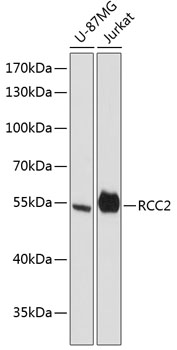-
Product Name
RCC2 Polyclonal Antibody
- Documents
-
Description
Polyclonal antibody to RCC2
-
Tested applications
WB
-
Species reactivity
Human
-
Alternative names
RCC2 antibody; TD-60 antibody; protein RCC2 antibody
-
Isotype
Rabbit IgG
-
Preparation
Antigen: Recombinant fusion protein containing a sequence corresponding to amino acids 323-522 of human RCC2 (NP_001129676.1).
-
Clonality
Polyclonal
-
Formulation
PBS with 0.02% sodium azide, 50% glycerol, pH7.3.
-
Storage instructions
Store at -20℃. Avoid freeze / thaw cycles.
-
Applications
WB 1:500 - 1:2000
-
Validations

Western blot - RCC2 Polyclonal Antibody
Western blot analysis of extracts of various cell lines, using RCC2 antibody at 1:3000 dilution.Secondary antibody: HRP Goat Anti-Rabbit IgG (H+L) at 1:10000 dilution.Lysates/proteins: 25ug per lane.Blocking buffer: 3% nonfat dry milk in TBST.Detection: ECL Basic Kit .Exposure time: 90s.
-
Background
Multifunctional protein that may effect its functions by regulating the activity of small GTPases, such as RAC1 and RALA. Required for normal progress through the cell cycle, both during interphase and during mitosis. Required for the presence of normal levels of MAD2L1, AURKB and BIRC5 on inner centromeres during mitosis, and for normal attachment of kinetochores to mitotic spindles. Required for normal organization of the microtubule cytoskeleton in interphase cells. Functions as guanine nucleotide exchange factor (GEF) for RALA. Interferes with the activation of RAC1 by guanine nucleotide exchange factors. Prevents accumulation of active, GTP-bound RAC1, and suppresses RAC1-mediated reorganization of the actin cytoskeleton and formation of membrane protrusions. Required for normal cellular responses to contacts with the extracellular matrix of adjacent cells, and for directional cell migration in response to a fibronectin gradient (in vitro).
Related Products / Services
Please note: All products are "FOR RESEARCH USE ONLY AND ARE NOT INTENDED FOR DIAGNOSTIC OR THERAPEUTIC USE"
